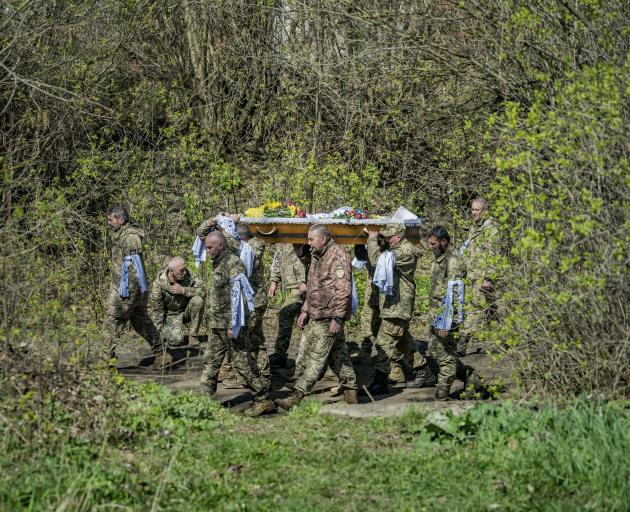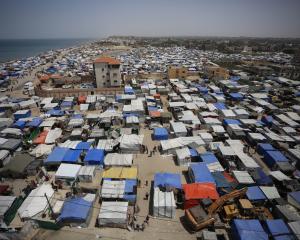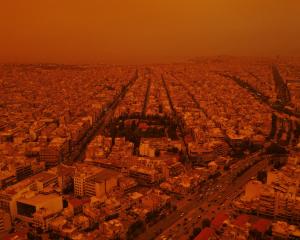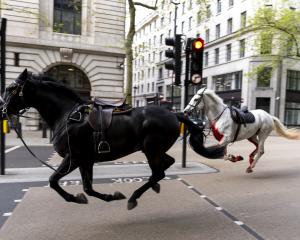
The Kremlin said Putin had attended a military command meeting in Ukraine's southern Kherson region and visited a national guard headquarters in eastern Luhansk. It did not say when the visits took place.
Putin heard reports from commanders of the airborne forces and the Dnieper army group as well as other senior officers who briefed him on the situation in the Kherson and Zaporizhzhia regions in the south.
"It is important for me to hear your opinion on how the situation is developing, to listen to you, to exchange information," Putin, 70, told the commanders.
Kherson, Zaporizhzhia, Luhansk and Donetsk are the four regions that Putin proclaimed annexed last September following what Kyiv and its Western allies said were sham referendums. Russian forces only partly control the four regions.
Russian troops retreated from Kherson city, the regional capital, last November, and have been reinforcing their positions on the opposite bank of the Dnipro River in anticipation of a Ukrainian counteroffensive.
While numerous Western leaders have made their way to Kyiv for talks with Ukrainian President Volodymyr Zelenskiy since Russian forces invaded 14 months ago, Putin has rarely visited parts of Ukraine under Russian control.
Last month, he visited Crimea - annexed by Russia in 2014 - and the southeastern city of Mariupol in Donetsk region.
A Russian winter offensive failed to make much progress and its troops have been bogged down in a series of battles in the east and south, where advances have been incremental and come at a huge cost to both sides.
HEAVY ARTILLERY
Fighting has raged in and around Bakhmut in Donetsk region for months, with Ukrainian forces holding out despite regular claims by Russia to have taken the mining city.
"Currently, the enemy is increasing the activity of heavy artillery and the number of air strikes, turning the city into ruins," the commander of Ukraine's ground forces, General Oleksandr Syrskyi, said in a statement on Tuesday.
Bakhmut's capture could provide a stepping stone for Russia to advance on two bigger cities it has long coveted in the Donetsk region - Kramatorsk and Sloviansk.

Russia says its "special military operation" in Ukraine, launched on Feb. 24 last year, was necessary to protect its security against what it sees as a hostile and aggressive West.
Ukraine and its Western allies say Russia is waging an unprovoked war aimed at grabbing territory.
'IRRESPONSIBLE'
A meeting of Group of Seven foreign ministers in Japan condemned on Tuesday a Russian plan to station shorter-range, so-called tactical nuclear weapons in Belarus, a Moscow ally which borders Ukraine.
It was the first time Russia had said it would station nuclear weapons on the territory of another country since the end of the Cold War three decades ago, and appeared to raise the stakes, at least symbolically, in an intensifying standoff with the West over the war in Ukraine.
In a communique issued at the end of a three-day meeting in Japan, G7 foreign ministers said: "Russia's irresponsible nuclear rhetoric and its threat to deploy nuclear weapons in Belarus are unacceptable."
"Any use of chemical, biological or nuclear weapons by Russia would be met with severe consequences," they said.
The G7 groups the United States, Japan, Germany, Britain, France, Italy and Canada, which have all imposed economic sanctions on Russia over its invasion of Ukraine.
The war in Ukraine has killed tens of thousands of people, levelled cities, forced millions from their homes and raised fears of a global food shortage because of disruption to grain supplies.
But the latest alarm over food appeared to be over as Russia's RIA news agency, citing the Russian foreign ministry, said inspections of ships moving grains from Ukraine have restarted after a pause which threatened to shut down the Black Sea shipping corridor.
A ministry official quoted by RIA blamed Monday's interruption on Ukraine's failure to observe agreed procedures but said the issue has been resolved.
It remains unclear if the grain deal, in place since last July, will be renewed, as Russia complains another agreement, aimed at facilitating its own agricultural and fertilizer exports, has not been upheld.












